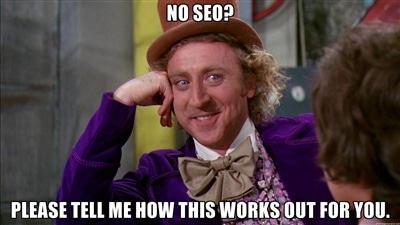SEO stands for Search Engine Optimisation.
Essentially, SEO is a series of actions taken to improve your website’s search engine visibility when people search for related services or products. Unless paying to be listed on a search engine results page (SERP), users visiting your site by this means is called Oganic Traffic.
Digital Marketing Hub specialises in search engine optimisation (SEO), providing services throughout Adelaide, Brisbane, Cairns and Australia wide. The goal of SEO is to have your website displayed organically on page 1 of the Search Engine Ranking Page (SERP).
Benefits of SEO:
- Generate Traffic
- Create Awareness
- Convert Customers
SEO can help build trust and credibility. If you turn up on page 1 of Google compared to page 10, who do you think has more trust?
If done correctly, SEO can greatly increase your online visibility and offers an excellent ROI (return on investment).
SEO basics
What is SERP? Search Engine Ranking Page. This is page that shows up when you search for something in Google. Your goal is to be up the top of the SERP.
What are Keywords? – Words or phrases that people type into a search engine when looking for a product or service. For example, SEO Cairns is a key phrase.
What are Longtail Keywords? – This is when someone might type in a more specific request. Normally consist of 4 or more words, are generally easier to rank for but higher conversion. Example – Where to Cairns SEO specialist. (longtail keyword)
What are Seed Keywords? Products, services and other topics included in your website. Seed words are a great place to start getting ideas for keyword ideas for your website.
On page SEO this refers to text and images.
Off page SEO – links that link back to your page, these links give your page authority. The more trusted the site that is linking to you the higher Google indexes your site.
Google E-A-T – Expertise – Google wants to see that you are an expert in your field. Authoritativeness – Google wants you to show that you are an authority in your field. Reviews, greatly help with this. Trustworthiness – You need to show users they can trust your website. Ensuring you have an SSL certificate is an important first step.
What is a META Tag?
Snippets of text that describes the page’s content. Appears in the website code.
Types of Meta tags =
Title Tag – The text at the top of your browser – Title page. These tags are a major factor in helping search engines understand what your page is about.
Meta Description Tag – Brief description of the tag. A good description can be the difference between someone clicking on your site instead of your competitors that may appear above or below you in SERP’s.
Meta Robots Tag – This tag tells search engine crawlers what they should do with the page.
Image, Video and Audio Tags – <ALT> Atribute Tags – Describes the contents of an image.
File names should also be optimised as Google uses these to gauge exactly what the subject of the image is.
When Google displays your website, it generally displays the same 3 pieces of date in a Featured Snippet.
- Title Tag
- Meta Description
- URL
Back linking – Backlinks are considered the ultimate ‘vote’ for your website. They are any links from another site back to yours. The more credible, reliable and authoritative sites that link to you means more ‘votes’ for your site!
How to get backlinks? Easiest way is to ask. Create amazing content that people will want to share. Create infographics, how to? Reach out to influencers in your industry. Can you swap a link in exchange for a testimonial? Remember, there are good and bad backlinks.
What makes a good link?
- Trustworthiness of linking domain
- Popularity of the linking page
- The relevancy of the content from the source page
- The anchor test used in the link
- The number of domains that link to the target page
- The ownership relationship between the source and target page
- The text directly surrounding the link
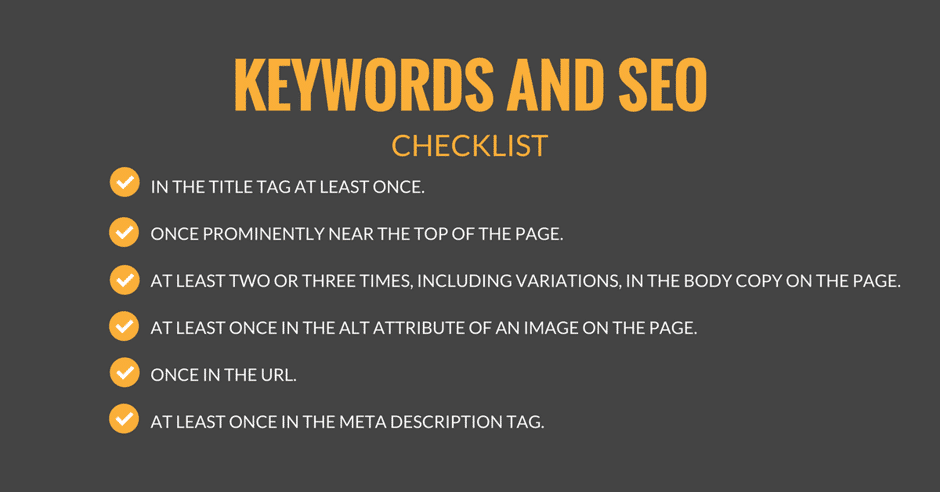
SEO helps GOOGLE find your site and rank it highly on the search pages!
Google uses algorithms to assess what sites to show and includes over 900 factors to determine the relevance of a website to a search query.
Factors that will influence your SERP ranking:
- Website content
- Website structure and internal links
- The searcher’s geographical location
- Mobile optimization
- Loading times
- Server accessibility
Keywords for different stages of the Customer Journey.
When thinking about keywords the best place to start is thinking about how the search query begins. To do this effectively it’s REALLY important to know your audience.
Does your customer need to:
- Do (something)
- Know (something)
- Go (somewhere)
What problem are you solving?
What stage of the customer journey is the keyword targeting (Awareness, Consider, Decide, Buy)
Awareness Stage – Brand building. Getting your message in front of as many people who might be as interested as possible. Clearly communication your value proposition.
Consider Stage – All about illustrating all the benefits of the product/service. Creating a compelling case why our product is better than the competition. Provide all the information to understand the product/service benefits
Decide Stage – Convincing prospect that our product is the best for their needs. Important to understand the barriers that might stop a purchase.
Buy Stage – Making the purchase process as easy and painless as possible. Consider highlighting deals, geographic, buying terms.
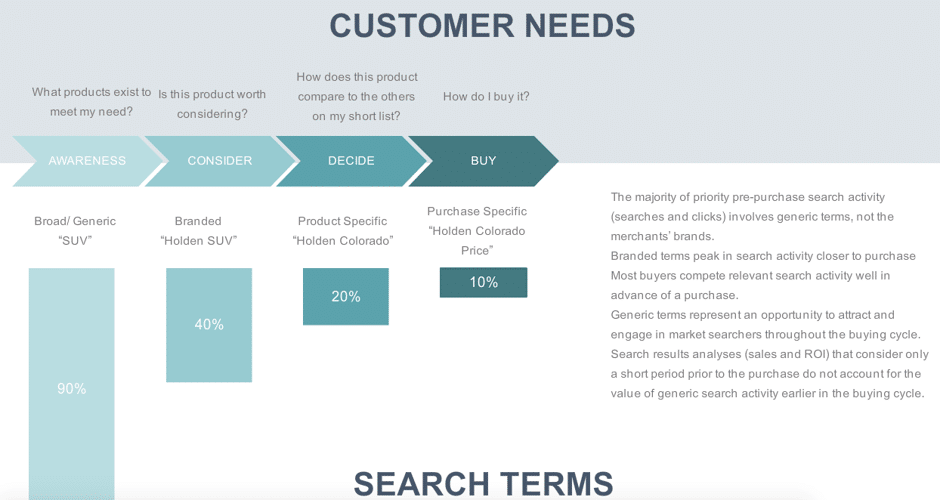
In 2020 20-50% of searches will be initiated by voice search. When choosing keywords think about how people would ask Google.
Tips to selecting Keywords
- Brainstorm a list of words/phrases that you think your target audience might use to look for your product or service.
- Write down 3-5 seed keywords (these words are very closely related to the products/services you offer).
- Identify Niche topics – Ways to find niche topics are really understanding your target market and completing a client persona, know what they like, where they live, how much they earn. You can also enter your “seed keyword’+”forums” to have a look at discussion threads and what topic ideas come up. Wikepedia table of contents. Look at Google’s related searches at the bottom of the search page.
- Use tools to discover more information. Google Keyword Planner, Answer the Public, Google Trends
Choosing the right keywords
There are three important criteria when selecting keywords:
- Search Volume
Find a search volume that suits your business. Choosing all keywords with really high search volume is not necessarily the right approach. If the keyword has massive amounts of traffic it can mean it’s more competitive and depending on the size of your business, your budget and how much content you are going to produce this might not be the best. You want to choose keywords with the right amount of traffic so it’s achievable for you to become number 1. Just make sure it is a keyword that gets some traffic!
- Commercial Intent
Will the keyword chosen relate to sales or a potential lead? For example something just searching Digital Marketing may just want to know what it is about and have no intention of using our service whereas if someone search The best Digital Marketing Agency in Cairns they are more likely to engage with our business.
- Competition
Most tools will give you insight into the competition of a keyword and if it is high or low. If competition is high then it means that there are a lot of other businesses who think about that keyword is also relevant to them and their customers.
What to Analyse
- Consider the number of monthly searches
- How relevant is your keyword is to your category
- How much competition does it have
- Suggested bid, gives you an idea of what the keyword would cost per click if you were to undertake Search Engine Marketing.
- Check out what your competitors are doing
Why potential customers may leave your site…
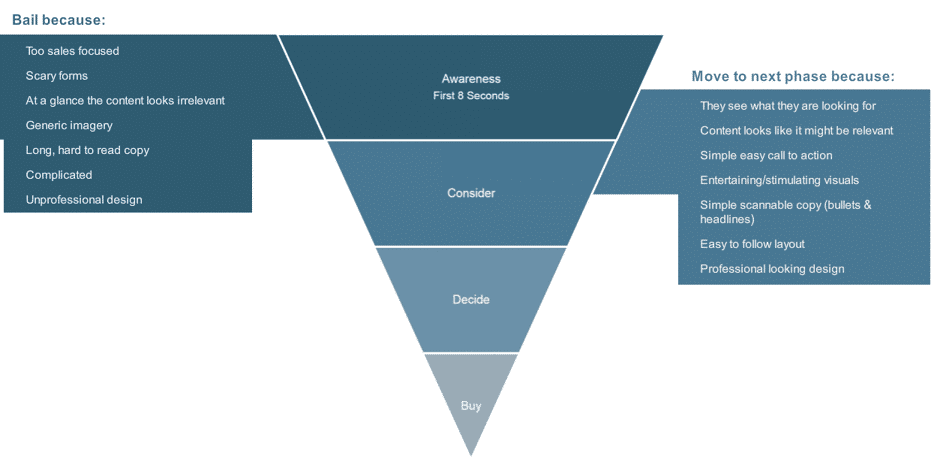
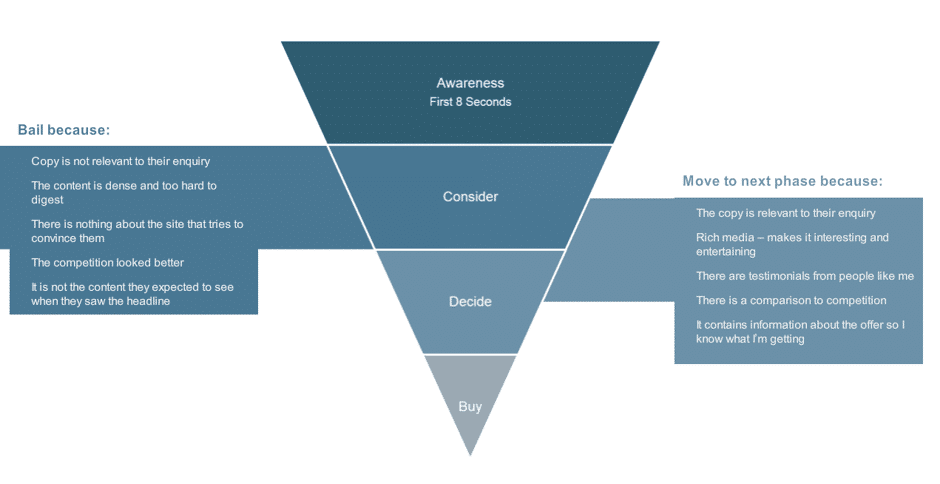
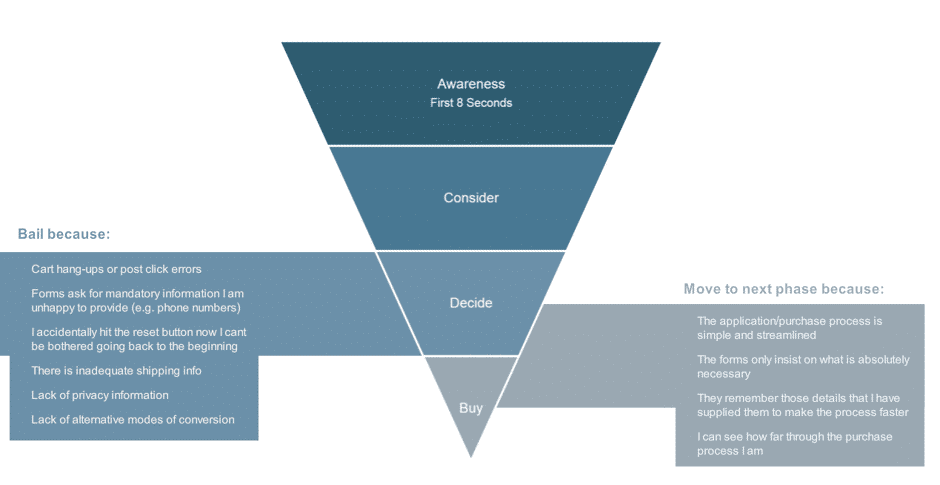
Extra ways to improve your SERP ranking…
Google My Business – Free Business Listing from Google
Google will choose a business listing and determine ranking by:
- Relevance
- Distance
- Prominence (reviews, business listings)
If you need a hand setting up your Google business profile check out our Google My Business package.
Business Listing Sites – Coming soon – list of all the recommended business listing sites.
Optimise all Social Media Platforms – This can be done by:
- Filling out all profile information
- Ensure your social handles, url’s are all relevant and match your business name
- Post high quality content with back links to your website.
Tools to help with your SEO
What NOT to do when it comes to SEO
Keyword stuffing – trying to fit as many irrelevant keywords onto your page as physically possible to rank higher. It is known search engines hate keyword stuffing and penalise sites for doing so.
Black Hat SEO – Hidden content on the back end of the website that isn’t visible to the audience.
Why SEO is crucial for small businesses
Understanding What Good SEO Is
Imagine buying a bricks and mortar store. It’s stunning, warmly welcoming and chock full of your amazing products that are sure to be walking out that door…. fast. Which is great news because you really need to make those sales to meet your financial requirements. After all, you gotta feed your family. And even better, you purchased that store for a bargain! Things are looking good, right?
Only problem is….. it’s located in the middle of, well, nowhere!
Bad SEO is just like owning a shop in the desert.

Bad SEO is Like Owning a Shop in the Desert
Here’s a question… Do you think your store will be successful? Even if you gave it, say, 6 months or so, will it be your financial bonanza?
Now I want you to imagine a brand-spanking-new website you’ve just had built (or built yourself). As with your imaginary bricks and mortar business, it looks great, it’s chock full of your amazing products or services and is loaded with all the fancy bells and whistles afforded to a stunning web design. Rub your hands together gleefully… because you’re going to make a motza!
How exciting, you or your website host has just made your site live. Now you’re open for business. Now what? Absolutely nothing! If you’re lucky, your website may show up on, oh let’s say page 7 of a Google search. And that’s if you have some relevant content in there to help Google’s Crawlers understand the intent of your website.
And here’s some more bad news… if you’re not on page 1 of a Google search result, you pretty much don’t exist. Think about it, how often do you search beyond page 1? Essentially, the lion’s share of Google clicks goes to the first 3 or so organic listings.
If you’ve launched a new website, this low ranking is to be expected. I mean, everyone at the top of Google is competing for that lucrative first page.
So how did they get there? The bigger question is… how do YOU get there? While the answer is simple, the effort behind it is not.
The Answer is SEO
But you already knew that didn’t you? Without your site being edited for Search Engine Optimisation, how will Google, or Bing, or whatever know what message you are trying to convey? How will you be placed above your competitors if search engines don’t think that you are relevant enough?
Sure, you can pay for some Google Ads in the short term (I recommend this for new sites) or even pay for Facebook Advertising, however paid advertising (PPC) is a different ball game to organic SEO which is FREE advertising.
Make no mistake, SEO can take quite a while to reap its benefits. Therefore, I highly encourage you to think of Search Engine Optimisation as an INVESTMENT IN YOUR FUTURE.
Invest In Your Future with SEO
Think about my last statement for a moment.
Search Engine Optimisation is an INVESTMENT IN YOUR FUTURE
Now let’s do some sums on that statement. Let’s say you’re on a $700 per month SEO Plan designed to optimise your site and build it out further with backlinking, blog posting and constant technical monitoring and editing.
Now let’s say that you’re currently ranked number 65 for a keyword with a monthly search volume of 400 clicks. That puts you somewhere in the middle of page 6 of a Google Search Engine Results Page (SERP), essentially meaning you simply don’t exist in the eyes of your potential clients.
Say your average sale price is $500. In 6 months’ time, and with some hard work from your SEO team, you’re now ranked number 2 on Google’s SERP. Yay… congrats! You’re most likely getting around 80 visits as a result of your current rank, that’s 80 potential clients visiting your store that you didn’t have before. If, and I really mean IF, your site is well designed to convert your new website visitors into raving fans, and based on recent 2021 E-commerce conversion rates, you’ll make 3 sales ($1500) from that one keyword.
In reality, you’ll have more than one keyword throughout your site, depending upon what your products or services are. If you have 4 key products or services and have a number 2 rank for each of those keywords with a similar search intent, you could be earning $6000 each month from your $700 monthly investment. Add another high ranking keyword to each product an you could average $24000 per month.
At this point, you’ll want to consider either continuing with your SEO strategy or modifying/reducing it to more of a caretaker capacity. Once you have that powerful SEO momentum, you’ll really want to hang on to your current SERP position.
Remember, your competitors are looking at your website to find ways to outrank you. They’ll be researching your own SEO strategy and will ALWAYS be nipping at your heels. It’s a long way to the top, but once you’re there…. It’s worth every penny!
The BIGGEST SEO mistake
Have you thought about trying SEO for your business but not sure if it will work or what it is all about?
If you’re in business, it’s highly likely you’ve heard of SEO.
As a Digital marketing Agency who specialises in SEO, we quite often get businesses come to us wanting SEO although not really sure what it means or what it involves.
How Google Search Works
When you type a search query into Google, this is when Google algorithm kicks in and does the hard work. The goal of SEO is to ensure the Google algorithm can read and find your site.
Google algorithm is looking for the best website to showcase the highest on the search engine results page (SERP) and several factors come into play.
Google sends out automated programs called spiders or crawlers to search the web, moving through the links and indexed pages to find the best quality page to showcase.
Google will index each website and assign a page rank to each result. The webpage with the highest score will be shown the highest on the search engine ranking page.
The spiders and crawlers are looking for websites that contain the same keyword as the search term typed into Google along with other relevant or similar terms. The spiders are looking at your page structure. Have you got keywords in relevant headings? Have you got just one H1 on each page making it clear what that page is about? Have you included relevant sub headings? Has your content got depth and shows relevance and authority in your field?
Google is also checking your website’s authority. If you have other sites linking or referencing your site, you will have more authority.
If you have images on your website, have you included alt text as Google can’t read images unless you tell Google what they are about?
Google also wants to show websites that offer an excellent user experience.
- Fast loading websites on all browsers (Chrome, Firefox etc.)
- Responsive, compatible on mobile, tables, laptops.
- A website’s age might also help the page strength and the strength of the domain name.
Many businesses might start with SEO and get their website optimised for the basics above. This is a great start although the reality is, it’s usually not enough to get to page 1!
The BIGGEST mistake businesses make is they think SEO is a one off
They’ve paid the money. They’ve had their site optimised and they sit back and expect to jump to page 1.
Sorry, not going to happen!
Have a think about how many other websites are competing for the top spots on Google. If you want to be competitive you need to be producing fresh content, adding depth to your website and telling Google that you are the authority in this field.
Did you know that the Top 3 spots on Google are the ones who get the bulk of the traffic?
That means if you really want to benefit from SEO and get free traffic you need to work hard to get into the top 3 spots.
This means;
Having the basics in place and THEN producing regular content, ensuring your website has fresh relevant content and gaining new backlinks. You can add a blog and produce regular content like this one 😉. You might add some FAQ’s to your website to increase depth.
The key is to KEEP IMPROVING YOUR WEBSITE!
Don’t expect to get to page 1 if you don’t put in the effort. The level of effort you need to put in will also be determined by how competitive your search terms are and competition.
Biggest Takeaway – If you are going to invest in SEO, which you should because EVERYONE searches on Google (or other search engines in general), then you need to do more than a one off! It’s a bit like sticking to a diet for a week and expecting big results 😂.
Need more information on how SEO can help your business? Check out our SEO page or simply pick up the phone or send us a message.
Conclusion – A Picture Is Worth 1000 Words
